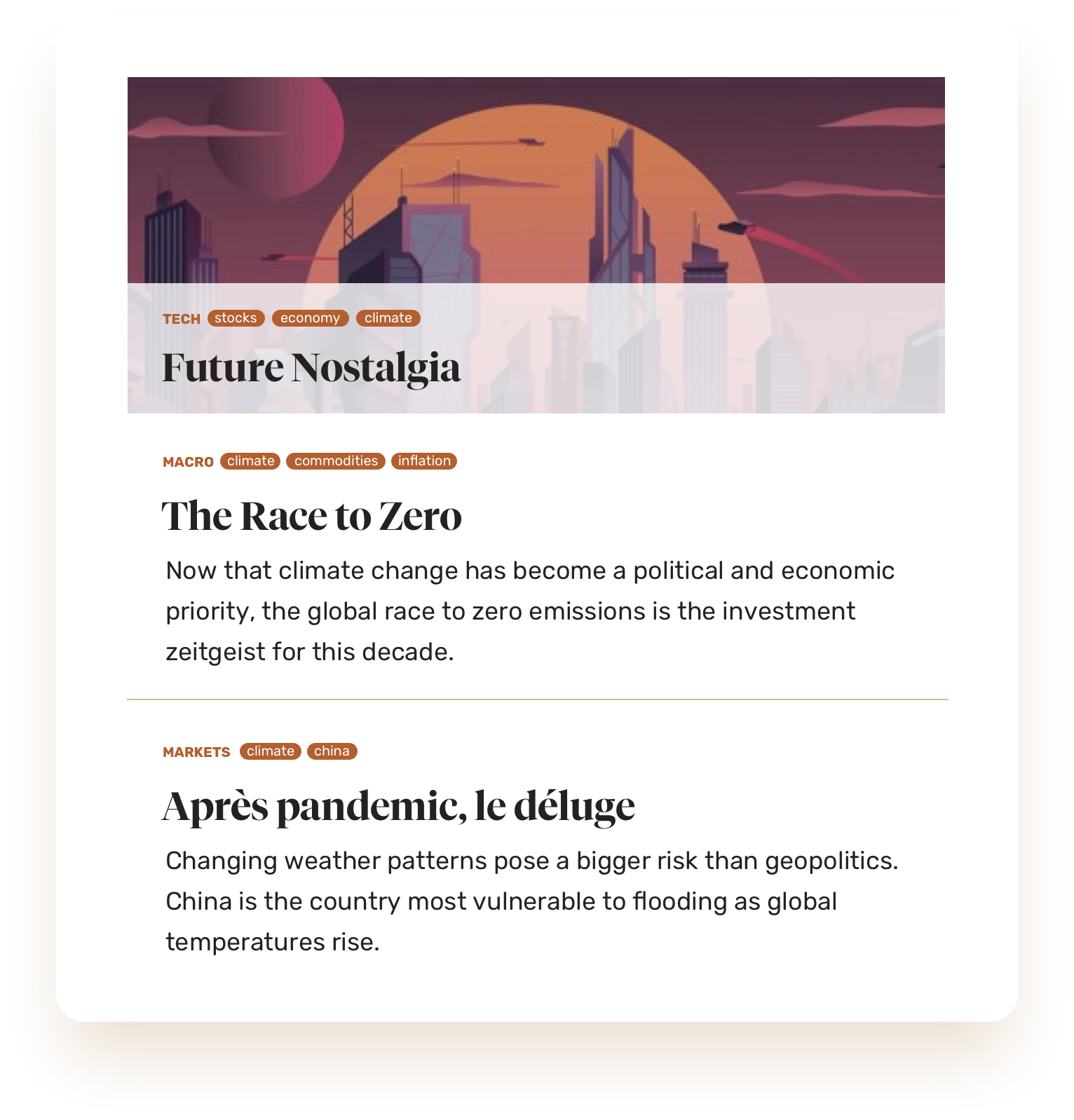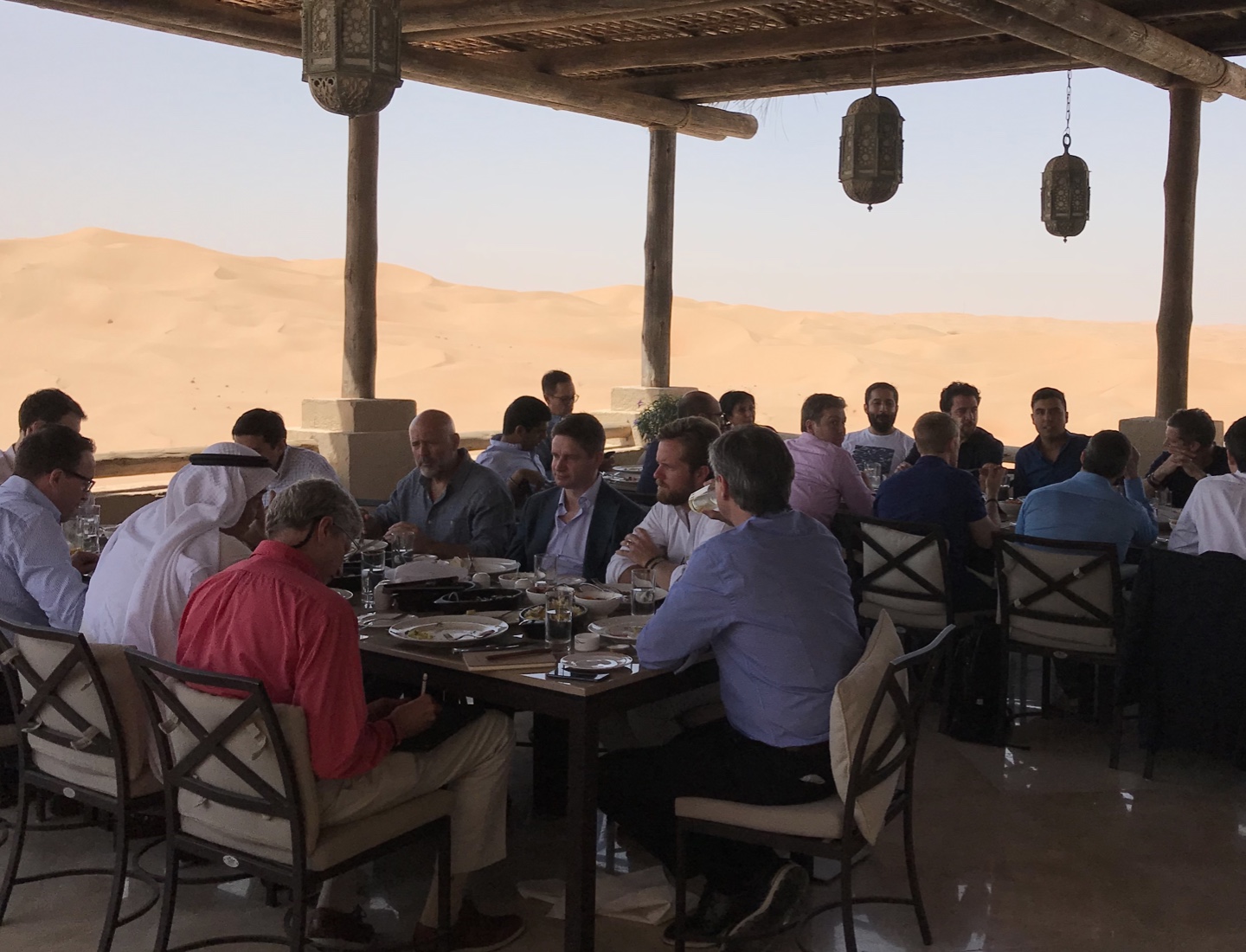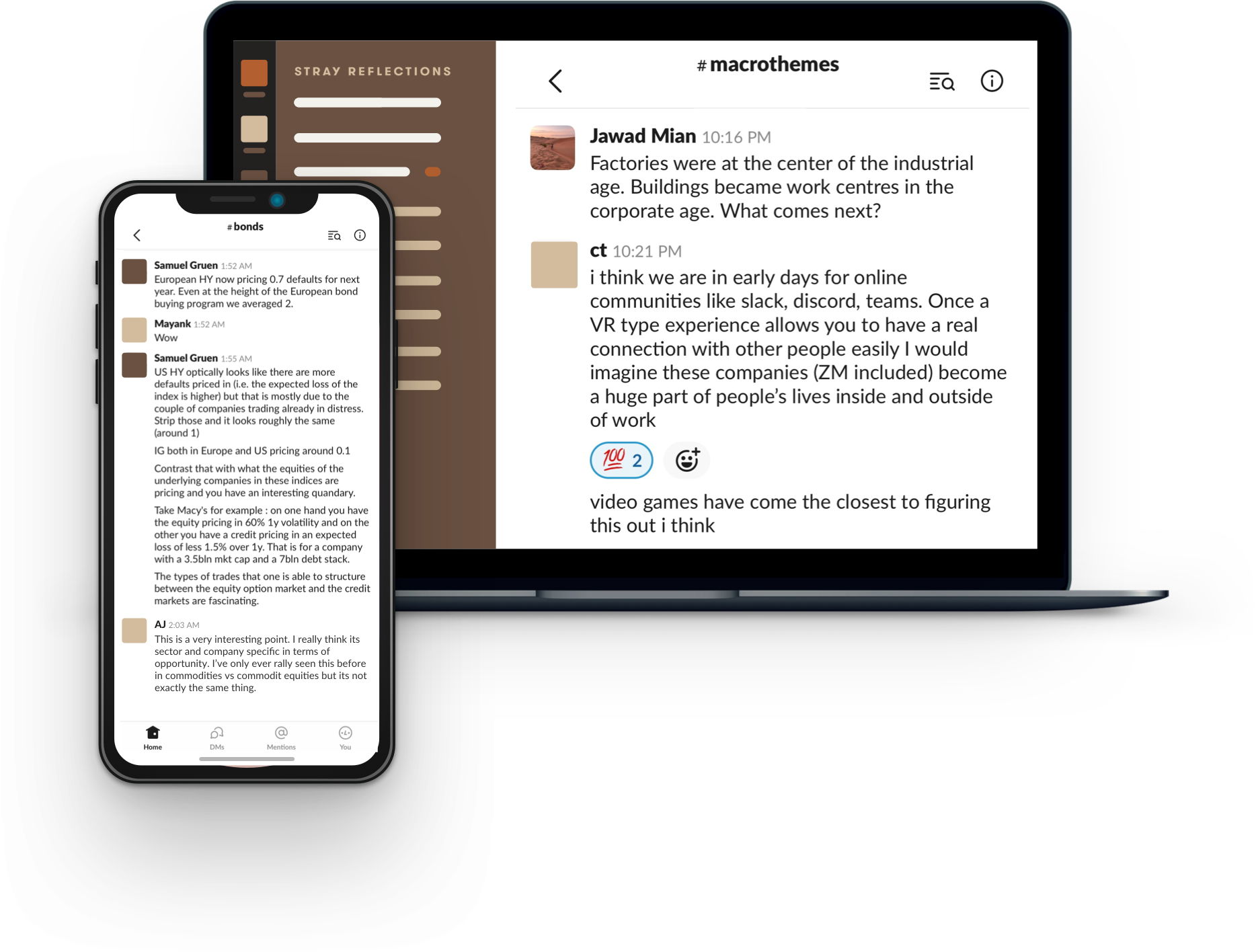Putting our heads together is what Stray Reflections does best. Here’s a summary of the most helpful insights gained from the community in our members-only Slack group last month.
1. Short Reason (#economy)
2. Long Casinos (#credit)
3. Short Kansas (#tech)
4. Long Obscurity (#life)
5. Short Buffett (#stocks)
Short Reason
CJ: I’m going to share a stream of consciousness. Bear with me.
Maybe THIS is the recession. And I don’t mean any sort of technical definition, but rather how a recession looks and feels in the economy. The US is a consumer driven economy, and we’ve had THE WORST consumer sentiment ever. Spend a minute to think about that.
There is a psychological principle where anticipating a negative event is worse than the event itself. Maybe this is what we’re suffering through.
If it coincides with a bullwhip economy suffering from inventory buildup, then what looks like a recessionary economy (too much inventory, too little spending) is actually just sentiment driven pullback as consumers “wait and see” and businesses are forced to adjust.
This feels like a recession, but one with low unemployment and a higher baseline level of spending versus typical recessions.
And unlike most recessions, it isn’t dollars being not spent because they’re not earned; it’s dollars being not spent because they’re a) not enough dollars post-inflation or b) those dollars are being saved (and thus will return to the economy at the appropriate time.)
Most of the companies I follow or read earnings reports talk about relatively weak numbers (relative to expectations) year-on-year but much higher versus 2019. This is lost in much of the discussion about how bad the economy is. On top of that there was little capex or investment made between 2019 and 2022.
So if we’re at a materially higher baseline level of consumer spend, then once businesses have right-d their inventories, employee count, cost structure for this “higher than 2019 but not the roaring twenties” spending level, things should get back on track.
If that were to happen, then there should be fewer defaults or other unforeseen economic issues. And maybe when inflation does find itself trending down and the Fed pulls back on rate hikes markets will stabilize and people will want to spend again.
Now, there is the issue of “long and variable lags” of the aggressive rate hikes to deal with. Given how much debt has termed out and how anticipated this downturn was, this should be manageable at the corporate level. And rates are at a high enough level that when they are cut it will have a meaningful economic impact on the US consumer.
Recent consumer wealth destruction is unprecedented, but most of that is in stocks and bonds (locked up retirement funds) or homes (locked up equity). Their liquid balance sheets are strong and unless we see unemployment pickup significantly they will continue the economic flywheel of work and spend.
This is very different than 2008 which put a hole in both consumer balance sheets (home prices and stocks crushed) AND income statements (10 percent unemployment and home equity cash-outs), for which 2010s spending suffered as consumers rebuilt their financial foundation.
SG: I think you are correct. This is the kind of high-octane economic cycle we should expect.
VS: Extremely cogent for a “stream of consciousness.”
Long Casinos
JM: Are you worried about credit here?
JC: No I was much more concerned in June. I think the risk of a negative feedback loop from underwritten finance commitments has been avoided largely. Most of it has been sold at manageable losses.
Most banks will be fairly risk on starting out 2023 with new budgets I think the concern around defaults is overblown. Eighty percent of the leveraged Loan index matures in 2026 or later. As of the third quarter, two thirds of the leverage loan index had an interest coverage of 4x or higher.
Because of the record amount of refinancing in 2021 most companies have a lot of flexibility to ride out higher interest rates and don’t have to issue at the current market rates.
That said, there was definitely a lot of very aggressive LBOs in 2020 and 2021, especially in TMT, so wouldn’t be shocked if we saw a lot of restructuring there. But to me that is fairly isolated to those PE deals and not representative of broader market.
JM: In 2022, 391 US companies filed for bankruptcy. It is the lowest total since at least 2010.
JC: Also I think people are too draconian in downside sceneries and don’t adjust to new realities. People quote 2008/09 as an example for trough revenue for Las Vegas casinos. But I would argue Vegas has transformed significantly since then.
It has a NFL and NHL team now, more expansive food scene, and likely a much more competitive international travel destination with a diversified entertainment offering. I would argue Vegas visitation and spend floor is much higher than 2008 trough, but most people don’t see it that way.
Short Kansas
JM: Some cool threads from this Ben Thompson discussion: Is remote work to white collar jobs what globalization was to blue collar? Why not hire someone in Indonesia instead of Kansas City?
We had automation in factories, now can we expect more automation in offices with AI (chatGPT as one example) which hurts white collar jobs?
All this means labor shortages will be resolved with more tech, and this leads to better productivity and wage growth that isn’t fueling inflationary pressures.
There was white collar smugness against blue collar workers, is that now reversing? Even real wage gains post-pandemic have largely been in lower quintile of jobs rather than higher paid white collar. I find this fascinating.
GS: Covid was to immutable office jobs, what China’s watershed 2001 WTO accession (perhaps even beginning during NAFTA) was to blue collar jobs. Ironically, in a world where the physical goods globalization has paused or moderated, maybe thinking about globalization as a physical goods trade is also becoming dated. I mean, I don’t really care about the who or where a service is created.
JM: About 1 percent of all jobs posted on LinkedIn pre-pandemic were remote. As of today, that number is about 14 percent. BUT what’s more fascinating is that north of 50 percent of all job applications on a daily basis on LinkedIn go to that 14 percent of remote jobs.
SG: Chat GPT is going to turbo charge productivity.
SB: I am a 2D and 3D character artist. I have been following the AI debate closely. Artists are in an uproar about generative AI stealing their images under the fair use policy to generate new art. They are also rightfully afraid of AI taking their jobs.
The Midjourney AI image generator is much more advanced than many people believe. It can already generate concept art at par or surpass the top-quality artists. It is not yet advanced enough to be able to iterate on those works and get exactly what your vision is, but that will come.
Why is music AI not successful and image AI is? Because music AI can’t train on the right data set. Music can’t be downloaded for free as images can. That’s why image AI is advancing at such a pace and music AI is more or less stuck.
I think the consequence of this will be that content will get placed behind paywalls to protect it from the grazing AI algorithms. Whether it’s source code, creative writing, or images. AI may change the open internet as we know it.
Long Obscurity
MT: Few individuals stay at the top of their game past some point in their forties. I have worked thirty years in the industry, and I have observed this phenomenon repeatedly.
Either they don’t (or cannot) make the constant investment in learning. Careers and personal life are demanding. It requires individuals with a remarkable level of energy, commitment, and focus to make the continuous investment in the necessary skills.
The few that I know that have succeeded often have a combination of exceptional intellect and few personal commitments.
They may lead fundamentally unbalanced, indeed unhappy, lives but their achievements can be truly impressive and inspirational. Or their success can invariably lead to overconfidence, hubris, and eventually career-ending errors.
Organizations are notoriously bad at addressing this. Instead of keeping superstar employees on the path of learning and humility, individuals are instead rewarded with increasing power, resources and responsibilities.
How many times have we witnessed superstars in our field go through marriage breakups and estranged children or go down in a phenomenal blowup or breakdown?
We all have a hard time taking a voluntary turn in, much less putting a hard stop to our career (even though we probably should). Success is a powerful drug. I know very few among us that take a step back and ask: is this what I want for the rest of my life?
We can always hope to get better, become richer, and reach for an ever more ambitious achievement.
Professional athletes come to grips early with this, because they understand from the start the hard limits of biology (and the ever-present risk of career-ending injuries). They are probably best at repurposing their lives, because they know they will reach that point sooner rather than later. No so in our field.
Finance is a sport that in theory can be practiced all the way through our life. But in practice, it cannot, or at least should not.
We can now enjoy longer useful lives, thanks to modern medicine and our knowledge of healthier lifestyles. I am fifty-six and I expect (statistically), given my current health and genetic history, to be physically and mentally highly active for another thirty years. Thirty years!
That’s like being twenty again.
So if I were that young, would I really want to do it all over? Or would I want to try something different?
Right now I have the time, resources, money and freedom to go back to school, learn a new profession, practice it and become good at it. Each choice we make early in life is the sacrifice of a path down which we decide not to travel. But what if we could go back and travel a different path?
I admire those who can stay at the top of their game and stick with it. They are truly exceptional individuals. I just think that’s not 99 percent of the rest of us.
I also admire those who know when to call it quits and choose a new path, especially one that will be marked by creativity, discovery, innovation, wisdom and making a difference to others.
But I do NOT admire—and in fact pity in a way—those who persist down the same path while clearly they are past their zenith. Why? What’s the point? Don’t they want to try something new and different? Have they no regrets? Is the world so uninteresting outside of their narrow field?
This is not a judgement, just an observation. I am still searching for that new path, but slowly converging on it. The pandemic was certainly conducive to this exercise of soul-searching and self-discovery. It is harder now.
When I was twenty I was young enough to know “everything”; now in middle-age, nothing is black or white, it is all shades of grey, and going down one path over another is a decision into which neither circumstance nor money hastily pushes me.
I have one foot in Vanaprastha and the other in Sannyasa, one could say. Putting one foot in front of the other may be pointless if it leads in circles (or worse, backwards); maybe it’s time to stop and look around, or up?
Short Buffett
MK: I enjoyed this anecdote shared by Fernando del Pino.
Benjamin Graham, Buffett’s mentor and author of The Intelligent Investor, retired when he was sixty after successfully achieving 20 percent annual returns.
He spent the remaining twenty years of his life doing different things (apart from merely making money), alternating between his homes in California and in the south of France, writing, reading and savoring, in his own words, “the world of the mind, from things of beauty and culture in literature and in art.”
In these final years, a journalist asked him why he had quit investing in the stock market. I leave you with his response in the hope that it might teach you something you won’t learn listening to today’s society. Graham smiled warmly and said: “Why should I try to get any richer?”
That’s what I’d call wisdom.







